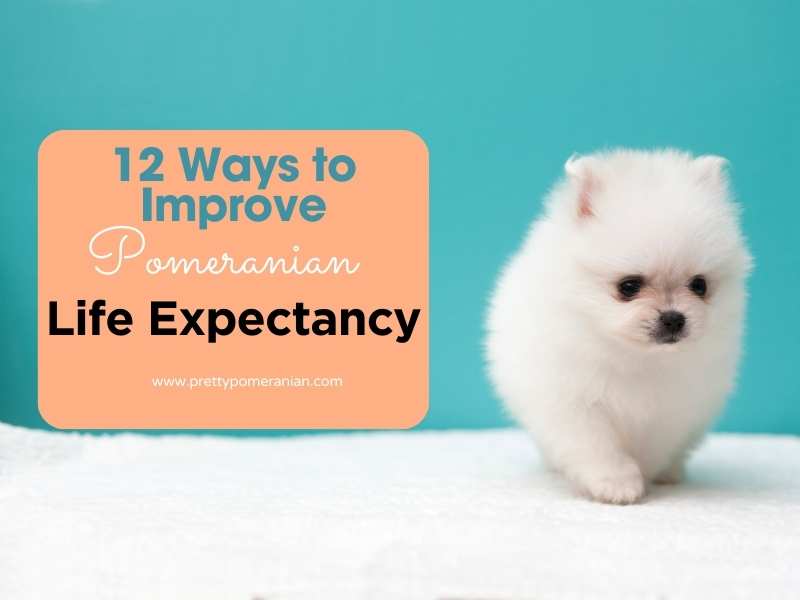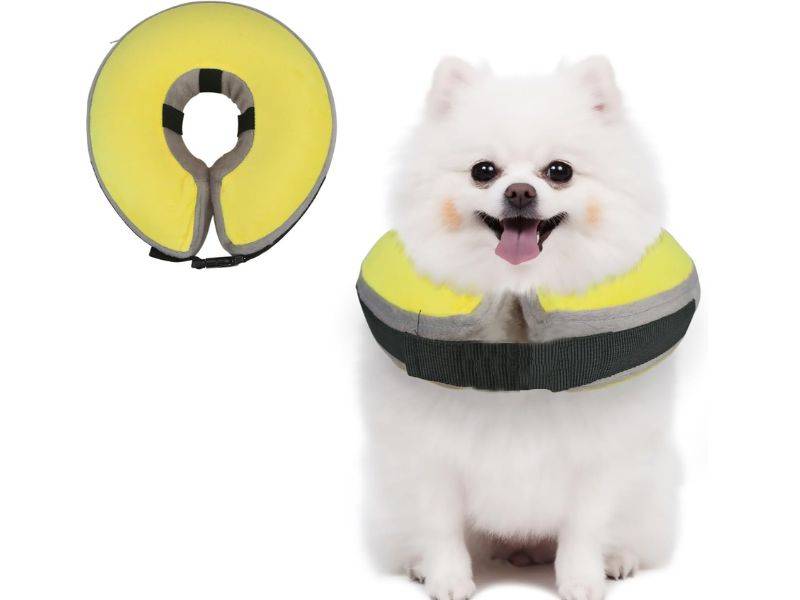
Curious about Pomeranians and their lifespan? Well, it’s always too short when it comes to these fluffy bundles of joy! On average, Pomeranians have a lifespan of 12-16 years, but some have been known to defy the odds and reach a remarkable 20 years. These pint-sized pups are generally robust, yet like all breeds, they can face specific health and environmental challenges.
In this article, we’ll delve into the typical lifespan of Pomeranians and provide insights into fostering a lengthy and thriving life for your adorable companion. So, what’s the scoop on how long Pomeranians live? Let’s explore!

Pomeranian Lifespan: How Long Do Pomeranian Live?
Pomeranians typically live for 12-16 years, although some may live longer with good care. This is fairly typical life expectancy for pooch of this size like Maltese and poodle
There are a number of common factors that can affect how long a pomeranian lives, including:
Various factors contribute to the lifespan of a Pomeranian, and being aware of these can make a significant difference in your furry friend’s longevity. Here are some key considerations:
1. Nutrition
Proper nutrition is crucial for Pomeranians, as it is for all dogs. Pomeranians, in particular, need a well-balanced diet to prevent issues like obesity.
2. Physical Exercise
Pomeranians thrive with regular exercise to maintain overall health and prevent potential heart and joint problems as they age.
3. Mental Stimulation
Providing consistent mental stimulation is vital for reducing stress and anxiety in Pomeranians, contributing to a healthier and potentially longer life.

4. Genetics
Like any breed, Pomeranians may have genetic factors that influence their health. Some Pomeranians may inherit certain conditions that can impact their lifespan.
By diligently caring for your Pomeranian and ensuring they lead a healthy lifestyle that includes proper nutrition, regular exercise, and mental stimulation, you can actively contribute to extending their lifespan and fostering a happy, vibrant companion.
5 Common Causes of Pomeranians Deaths
Discussing the unfortunate reality of Pomeranian lifespans can be difficult, but understanding the common causes of their deaths can help us prepare and take preventive measures. Here are five common factors that contribute to Pomeranian mortality:
1. Heart Disease
Pomeranians are susceptible to heart disease, a condition that can significantly impact their lifespan. Regular veterinary check-ups and a heart-healthy lifestyle can contribute to early detection and management of cardiac issues.
2. Accidents and Trauma
Due to their small size, Pomeranians may be more prone to accidents and trauma. This includes the risk of being stepped on, falling from heights, or getting injured in everyday activities. Owners should create safe environments and closely supervise their Pomeranians to prevent accidents.

3. Dental Issues
Dental problems, such as periodontal disease, are common in Pomeranians and can lead to various health issues, including heart and kidney problems. Regular dental care, including brushing and professional cleanings, can help mitigate these risks.
4. Respiratory Complications
Pomeranians are known for their distinctive flat faces, which can contribute to respiratory difficulties. Brachycephalic breeds, like Pomeranians, may experience issues such as tracheal collapse or respiratory distress. Maintaining a healthy weight and avoiding situations that cause excessive panting can be beneficial.
5. Genetic Conditions
Pomeranians may inherit certain genetic conditions that impact their health and lifespan. These conditions can range from neurological disorders to musculoskeletal issues. Responsible breeding practices and regular veterinary care can help manage and address these genetic predispositions.
While it’s heartbreaking to consider the lifespan of our beloved Pomeranians, being aware of these potential challenges allows us to take proactive steps in ensuring their well-being and providing them with the best possible quality of life.
12 Ways to Improve Pomeranian Life Expectancy
Improving the life expectancy of your cherished Pomeranian involves adopting various practices to promote their overall health and well-being. Here are twelve essential tips for enhancing the lifespan of your beloved Pomeranian:

1. Regular Exercise
Ensure your Pomeranian gets plenty of exercise to maintain a healthy heart, reduce the risk of cardiovascular diseases, and prevent joint problems later in life. Exercise also boosts the immune system and promotes mental well-being.
2. Leash Control
Be vigilant about keeping your Pomeranian on a leash, especially near roads or hazardous areas. Their curious nature and keen sense of smell may lead them into danger, making leash control crucial for their safety and longevity.
3. Balanced Diet

Provide a well-balanced diet rich in protein, low in fat, and supplemented with fresh fruits and vegetables. Avoid commercial dog food with fillers or artificial ingredients to support their overall health and extend their life expectancy.
4. Table Scraps Caution
Resist the temptation to feed table scraps to your Pomeranian, as these can contribute to obesity and other health issues. Monitor their food intake to prevent overeating, and maintain a healthy diet to promote longevity.
5. Pomeranian-Proof Your Home
Create a safe environment by securing poisonous substances, blocking small spaces, installing child gates, and securing trash cans. Pomeranians’ natural curiosity makes them prone to exploring, so removing potential hazards improves their safety and life expectancy.
6. Stress Reduction
Minimize stress levels in your Pomeranian to enhance their immune system and prevent digestive problems. Provide ample exercise, socialization, and mental stimulation, and avoid leaving them alone for extended periods to reduce anxiety.
7. Mental Stimulation

Engage your Pomeranian’s mind with activities such as learning new tricks, interactive games, and puzzles. Mental stimulation not only keeps their minds sharp but also combats boredom and anxiety, contributing to a longer, healthier life.
8. Consistent Training
Consistent training not only strengthens your bond with your Pomeranian but also keeps them safe and healthy. A well-trained dog is less likely to engage in risky behaviors, reducing the chances of accidents or conflicts with other animals.
In addition, a well-trained dog is less likely to develop behavioral problems that can lead to stress and anxiety.
Our favorite online training course for teaching a pomeranians to listen is K9TI Total Transformation Masterclass, or you can take your pick from this list based on their training needs.
As any dog owner knows, training takes time and patience, however, the effort is well worth it when you see your pom pom happily responding to commands and learning new tricks.
9. Regular Vet Checks

Schedule regular veterinary checkups to identify potential health problems early on. Early detection allows for timely intervention, potentially extending your Pomeranian’s life by several years through preventive care.
10. Neutering or Spaying
Opt for neutering or spaying to reduce the risk of infections and behavioral issues. This simple procedure can help prevent certain cancers and promote a longer and healthier life for your Pomeranian.
11. Good Dental Hygiene
Practice good dental hygiene by regularly brushing your Pomeranian’s teeth and scheduling dental checkups. Poor dental health has been linked to various serious illnesses, so maintaining oral hygiene contributes to their overall well-being.
12. Check for Ticks
Regularly check your Pomeranian for ticks, especially after outdoor activities. Ticks can transmit diseases, and prompt removal or veterinary attention ensures your Pomeranian stays healthy and disease-free.Check our ticks tool removal
By incorporating these practices into your Pomeranian’s care routine, you can actively contribute to their well-being and increase the likelihood of a longer, healthier life.

Can Pomeranians Surpass 15 Years in Lifespan?
While the average lifespan of a Pomeranian is around 12 years, it’s not uncommon for many to exceed 16 years or even longer. Various factors play a crucial role in determining a Pomeranian’s longevity, including their diet, exercise routine, environmental conditions, and genetic makeup.
For instance, Pomeranians that are provided with a high-quality diet and receive ample exercise are more likely to enjoy an extended lifespan compared to those lacking in these areas. Moreover, Pomeranians with a lineage of long-lived ancestors are generally more predisposed to reaching an advanced age.
Although there’s no guarantee that every Pomeranian will reach the age of 15 or beyond, diligent care and attention to your furry companion’s well-being significantly increase the likelihood of them leading a prolonged and content life.

When is a Pomeranian Considered Old?
A Pomeranian typically has a lifespan of around 12-16 years, and they are generally deemed to be an ‘old Pomeranian’ once they reach approximately 80% of their life expectancy. This implies that a Pomeranian who has reached the age of 9-10 is considered a senior dog.
During this stage of their lives, they may begin to encounter certain age-related health issues, such as arthritis, changes in vision and hearing, and potential kidney concerns. As they transition into their golden years, it becomes crucial to monitor their health closely and provide the affection and attention they require to relish their senior phase.
With a bit of extra tender loving care, your senior Pomeranian can continue to indulge in all the activities they adore – whether it’s leisurely walks or cozying up on the couch – for numerous years to come.

Oldest Pomeranian in the World
Fluffy held the title of the oldest Pomeranian in the world, reaching the impressive age of 25. Born in 1996 in California, USA, Fluffy’s long and joyful life came to an end in 2021.
At one point, Fluffy proudly held the Guinness World Record for being the oldest living dog, serving as a remarkable testament to how a Pomeranian can thrive and enjoy a lengthy and content existence with attentive care.
Lifespan of a Pomeranian Mix Dog
Pomeranian-mix dogs generally boast a lifespan that tends to surpass that of purebred Pomeranians. One contributing factor to this longevity is their reduced susceptibility to certain hereditary health conditions.
Due to their more diverse gene pool, Pomeranian mixes are often less prone to issues like heart disease or cancer. Additionally, these mixes frequently enjoy the advantages of hybrid vigor, enhancing their resilience against environmental stressors and promoting an extended, healthier life.
While no assurances can be made regarding lifespan, opting for a Pomeranian-mix is often a favorable choice for individuals seeking a canine companion with an extended life expectancy.
Pomeranian Life Expectancy vs Other Breeds

When it comes to life expectancy, Pomeranians boast a slightly higher average compared to many other dog breeds. Pomeranians typically live around 12-16 years, surpassing the general average for all dog breeds, which hovers around 10-13 years.
What contributes to this extended lifespan for Pomeranians?
Firstly, Pomeranians are petite dogs, a characteristic often associated with longer lifespans in canines. Additionally, they are generally robust and healthy, with fewer major health concerns compared to some other breeds.
It’s important to note that individual variations exist, and while some Pomeranians may not reach the average lifespan, others may exceed it. Overall, Pomeranians tend to enjoy a slightly higher life expectancy when compared to the broader spectrum of dog breeds.
However, it’s worth mentioning that Pomeranians don’t claim the title of the longest-lived breed. That honor belongs to the Chihuahua, with an impressive average lifespan of 15-20 years!

So, How Long Do Pomeranians Live?
Typically, Pomeranians have a lifespan of 12-16 years, surpassing the average for dogs in general. This longevity is attributed, in part, to the fact that Pomeranians are generally robust dogs with fewer major health concerns.
While each Pomeranian is unique and may have a lifespan that varies from the average, they generally exhibit a commendable life expectancy. With dedicated care and attention, Pomeranians can lead a lengthy and joyful life.
We trust that this information has provided valuable insights into the lifespan of Pomeranians.
Immerse yourself in a realm of Pomeranian tales, expert advice, and a supportive community of enthusiasts. Subscribe to our newsletter today!







